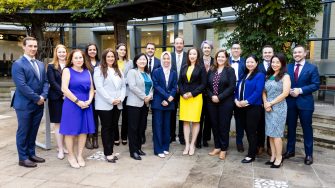AGSM again ranks among the world’s top Full-Time MBA programs in 2023 global rankings
AGSM @ UNSW Business School is the only Australian MBA program to feature in the Financial Time’s annual ranking of the world’s top 100 MBA programs.
AGSM @ UNSW Business School is the only Australian MBA program to feature in the Financial Time’s annual ranking of the world’s top 100 MBA programs.

AGSM climbed three spots since the ranking were last released in 2022, finishing 95th and maintaining its position in the top 100 programs globally. AGSM performed particularly well in metrics associated with Diversity including sector diversity (1); female faculty (12), international faculty (15) and international mobility (17). Sector diversity is calculated according to the diversity of sectors students worked in at the time of admission, before undertaking the MBA.
“Ranking first in sector diversity is the result of our intentional focus on recruiting an international cohort with different personal and professional backgrounds,” said Professor Nick Wailes, AGSM Director, Senior Deputy Dean UNSW Business School.
“I think this reflects both the international mindset of our cohort and facility, and the value our alumni place on the excellent exchange opportunities that we have on offer,” he said.
“Peer-to-peer learning is a pillar of our program’s success and graduates join the AGSM’s global alumni network of over 18,000 successful business leaders,” he said.
AGSM ranked 25th in Environmental Social Governance (ESG) and Net Zero teaching, calculated as the proportion of teaching hours from core courses dedicated to ethics, social, environmental issues and climate solutions for how organisations can reach net zero.
“In 2021, AGSM embedded principles of responsible management - deepening our commitment to principles of sustainability, ethics, and inclusion - in our Full-Time MBA program,” said Associate Professor Michele Roberts, AGSM Academic Director, Associate Dean (Post-Experience) UNSW Business School.
“There is a push from industry and MBA candidates alike to develop leaders who have strong ESG qualifications. This is our focus – to equip a new generation of leaders to make an impact in an accelerating world, and build a more sustainable and inclusive world,” said Roberts.
“Our refreshed 12-month Full-Time MBA program, with an emphasis on Responsible Management and sustainable business, is very attractive to global MBA candidates who are looking to enhance their career opportunities, move into a new industry, or start their own business.”
# # #
The FT Global MBA Rankings are calculated based on 20 criteria. Alumni responses inform eight criteria that together contribute 61% of the ranking. Eleven criteria are calculated from school data, accounting for 29% of the ranking. KPMG audits a number of schools every year. The remaining criterion, the research rank, counts for 10%. The alumni surveyed this year were the 2019 Full-Time MBA cohort.
For more information and to view the full rankings results, click here.
For media enquiries, contact Kate Bettes at k.bettes@unsw.edu.au.